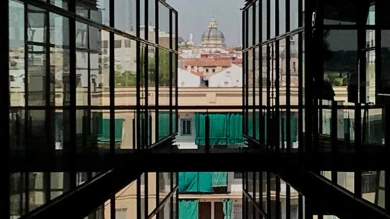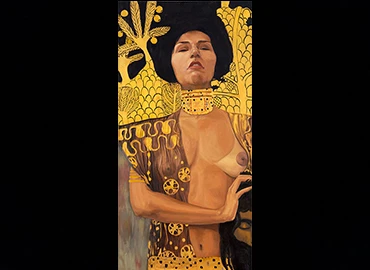-
30 de junio y 7 de julio, 2018 – 19:00 h / Edificio Sabatini, Auditorio
Queerama. Daisy Asquith
Intervalo 15
Queerama reconstruye la historia de los movimientos LGTBIQ+ y de sus representaciones en el cine y en la cultura popular desde comienzos del siglo XX hasta hoy a partir del montaje de fragmentos de informativos, documentales y cine de ficción procedentes del ingente archivo fílmico del British Film Institute (BFI). La película atraviesa un conjunto polifónico de experiencias de diversidad sexual, que incluyen persecuciones públicas y condenas judiciales, criminalización y patologización, pero también liberación sexual, tácticas de visibilidad y orgullo, y conquista de derechos. La banda sonora de John Grant, Goldfrapp y Hercules & Love Affair complementa las imágenes y nos sumerge en la historia de las relaciones, deseos, miedos y expresiones de disidencia a la norma heterosexual.

-
3 de julio, 2018 – 18:00 h / Edificio Nouvel, Centro de Documentación
¿Archivo Queer?
Una activación
¿Archivo queer? es un proyecto de colaboración impulsado desde 2012 por el Museo Reina Sofía. A la investigación que realizaron, dentro del programa de Residencias de Investigación 2013-2014, Sejo Carrascosa, Lucas Platero, Andrés Senra y Fefa Vila, cuyo objeto fue pensar un archivo a partir de un cuestionamiento queer de los principios que rigen el archivo institucional clásico, se sumó el Centro de Documentación del Museo, cuyo equipo se ocupó de la recopilación de la documentación, las negociaciones con los activistas y su posterior catalogación e integración en las colecciones documentales del Museo.
En esta ocasión, el equipo del Centro de Documentación que participó en el proceso de recopilación y catalogación propone una visita comentada al archivo.
Aforo: 15 personas
Plazas agotadas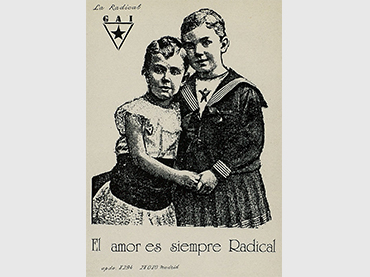
-
Miércoles 4 de julio, 2018 Sala de Protocolo, Nouvel
Voces situadas 2
Otros orgullos
Tras el primer encuentro del programa Voces situadas, celebrado el pasado mes de marzo, que ponía el foco en torno a los distintos feminismos actuales surgidos desde identidades diversas y hasta ahora poco visibilizados, este segundo foro reúne a representantes de colectivos que quieren diferenciarse críticamente de la convocatoria general, afirmándose ante los procesos de exclusión y normalización que, desde su punto de vista, domestican el desacuerdo con los patrones sexuales y de género dominantes.
Las voces de la periferia han sido particularmente activas en los últimos años en la contestación de un modelo de celebración que tiende a invisibilizar la diversidad y los problemas reales de la gran masa del colectivo LGTBQ que habita fuera de los centros metropolitanos. Entre los colectivos que participarán en este foro se encuentran el Orgullo Vallekano, el Orgullo Periférico y los Migrantes transgresorxs.
Participan:
Javier F. Bujarrabal y Silvia Hernández de Dios (Orgullo Periférico)
Francisco Godoy Vega y Kimmy/Leticia Rojas Miranda (Migrantes Transgresorxs)
José Alberto Castillo y Silvia Iturraspe (Orgullo Vallekano)En el marco de la serie:
Voces situadas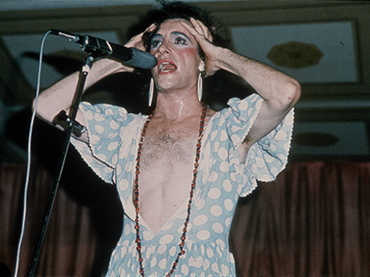
-
4, 5 y 6 de julio, 2018
“Hablo por mi diferencia”
Un recorrido LGTBIQ+ por la Colección
Miércoles 4 de julio 19:30 h
Jueves 5 de julio 19:30 h
Viernes 6 de julio 19:30 h
Punto de encuentro: conexión entre Edificio Sabatini y Edificio Nouvel, Planta 1El itinerario Hablo por mi diferencia es un recorrido por la España de la segunda mitad de la década de los setenta que desafiaba las convenciones morales del franquismo. Estas salas de la Colección centran su atención en la gestación de la contracultura y en la “Ley de peligrosidad y rehabilitación social” como detonante de la principal reivindicación política de esos años, convertida en símbolo de lucha por las libertades. Esta confrontación se visibilizó en manifestaciones muchas veces no exentas de polémicas por el espíritu transgresor de las acciones de protesta organizadas en las calles.
Algunos de los artistas que componen este recorrido guiado por la Colección desde una lectura en clave de la disidencia sexual se encuentran: Colita, Pedro Lemebel, Joaquín de Molina, Nazario, Ocaña, Manuel Quejido, Sergio Zevallos o Iván Zulueta, entre otros.

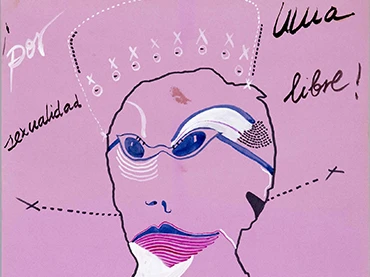
Held on 30 Jun 2018
En el marco de las conmemoraciones de la revuelta de Stonewall, ocurrida en Nueva York el 28 de junio de 1969, el Museo Reina Sofía ha programado un conjunto de actividades (de debate, cine, visitas a la Colección y al ¿Archivo Queer?) que se inscriben en algunas líneas permanentes de trabajo del Museo sobre la disidencia sexual y los múltiples ejercicios de libertad que ponen en cuestión la norma heteropatriarcal.
Si la resistencia a la violencia institucional y la crítica de la norma fueron las estrategias centrales de los años ‘80-‘90 frente a los procesos de “normalización” de la homosexualidad y a la crisis del SIDA, los primeros años del nuevo siglo abren la posibilidad de inventar nuevas formas de subjetivación y de producción social desde la enunciación orgullosa de la diferencia. El conjunto de actividades reunidas a lo largo de esta semana articula, entonces, el rescate de memorias disidentes con los debates sobre la actualidad y las derivas futuras del movimiento LGTBIQ+, en pos de reivindicar los múltiples modos de vivir una sexualidad libre.
Esta serie de actividades se enmarcan en el conjunto de iniciativas anteriores tales como el programa Prácticas Críticas. Somateca (2012-2014), las Jornadas Crip-Queer. Cuerpos abyectos entrelazando vidas (2014), la proyección del documental Yes we fuck! (2015) o la performance The Touching Community (2017), con las que el Museo Reina Sofía aspira a participar en la construcción colectiva de un entramado de pensamiento, investigación e imaginación radical en torno al cruce entre lenguajes artísticos, pensamiento crítico y activismos LGTBIQ+.
Organised by
Museo Reina Sofía


Más actividades

Difficulty. Forms and Political Effects of Deviation in Writing and Contemporary Art
23 February – 14 December 2026 – Check programme
Difficulty. Forms and Political Effects of Deviation in Writing and Contemporary Art is a study group aligned towards thinking about how certain contemporary artistic and cultural practices resist the referentiality that dominates the logics of production and the consumption of present-day art. At the centre of this proposal are the concepts of difficulty and deviation, under which it brings together any procedure capable of preventing artistic forms from being absorbed by a meaning that appears previous to and independent from its expression. By ensuring the perceptibility of their languages, difficulty invites us to think of meaning as the effect of a signifying tension; that is, as a productive and creative activity which, from the materiality of art objects, frees aesthetic experience from the representational mandate and those who participate in it from the passiveness associated with tasks of mimesis and decoding.
The economy of the referential norm translates the social logic of capitalism, where insidious forms of capturing subjectivity and meaning operate. In the early 1980s, and adopting a Marxist framework, poet Ron Silliman highlighted how this logic entailed separating language from any mark, gesture, script, form or syntax that might link it to the conditions of its production, rendering it fetichised (as if without a subject) and alienating its users in a use for which they are not responsible. This double dispossession encodes the political strategy of referential objectivity: with no subject and no trace of its own consistency, language is merely an object, that reality in which it disappears.
The political uses of referentiality, more sophisticated today than ever before, sustain the neoliberal-extractivist phase of capitalism that crosses through present-day societies politically, economically and aesthetically. Against them, fugitive artistic practices emerge which, drawing from Black and Queer studies and other subaltern critical positions, reject the objective limits of what exists, invent forms to name what lies outside what has already been named, and return to subjects the capacity to participate in processes of emission and interpretation.
Read from the standpoint of artistic work, the objective capture of referentiality may be called transparency. Viewed from a social contract that reproduces inequality in fixed identity positions, transparent in this objectivity are, precisely, the discourses that maintain the status quo of domination. Opposite the inferno of these discourses, this group aims to collectively explore, through deviant or fugitive works, the paradise of language that Monique Wittig encountered in the estranged practices of literature. For the political potency of difficulty — that is, its contribution to the utopia of a free language among equals — depends on making visible, first, its own deviations; from there, the norm that those deviations transgress; and finally, the narrowness of a norm which in no way exhausts the possibilities ofsaying, signifying, referring and producing a world.
From this denouncement of referential alienation, fetishisation and capture, Difficulty. Forms and Political Effects of Deviation in Writing and Contemporary Art turns its attention to the strategies of resistance deployed by contemporary artists and poets. Its interest is directed towards proposals as evidently difficult or evasive as those of Gertrude Stein, Lyn Hejinian, Theresa Hak Kyung Cha, Kameelah Janan Rasheed, Kathy Acker, María Salgado and Ricardo Carreira, and as seemingly simple as those of Fernanda Laguna, Felix Gonzalez Torres and Cecilia Vicuña, among other examples that can be added according to the desires and dynamics of the group.
The ten study group sessions, held between February and December, combine theoretical seminars, work with artworks from the Museo Reina Sofía’s Collections and exhibitions, reading workshops and public programs. All these formats serve as spaces of encounter to think commonly about certain problems of poetics — that is, certain political questions — of contemporary writing and art.
Difficulty. Forms and Political Effects of Deviation in Writing and Contemporary Art inaugurates the research line Goodbye, Representation, through which the Museo Reina Sofía’s Studies Directorship seeks to explore the emergence of contemporary artistic and cultural practices which move away from representation as a dominant aesthetic-political strategy and redirect their attention toward artistic languages that question the tendency to point, name and fix, advocating instead for fugitive aesthetics. Over its three-year duration, this research line materializes in study groups, seminars, screenings and other forms of public programming.

Institutional Decentralisation
Thursday, 21 May 2026 – 5:30pm
This series is organised by equipoMotor, a group of teenagers, young people and older people who have participated in the Museo Reina Sofía’s previous community education projects, and is structured around four themed blocks that pivot on the monstrous.
This fourth and final session centres on films that take the museum away from its axis and make it gaze from the edges. Pieces that work with that which is normally left out: peripheral territories, unpolished aesthetics, clumsy gestures full of intent. Instead of possessing an institutional lustre, here they are rough, precarious and strange in appearance, legitimate forms of making and showing culture. The idea is to think about what happens when central authority is displaced, when the ugly and the uncomfortable are not hidden, when they are recognised as part of the commons. Film that does not seek to be to one’s liking, but to open space and allow other ways of seeing and inhabiting the museum to enter stage.

Intergenerationality
Thursday, 9 April 2026 – 5:30pm
This series is organised by equipoMotor, a group of teenagers, young people and older people who have participated in the Museo Reina Sofía’s previous community education projects, and is structured around four themed blocks that pivot on the monstrous.
The third session gazes at film as a place from which to dismantle the idea of one sole history and one sole time. From a decolonial and queer perspective, it explores films which break the straight line of past-present-future, which mix memories, slow progress and leave space for rhythms which customarily make no room for official accounts. Here the images open cracks through which bodies, voices and affects appear, disrupting archive and questioning who narrates, and from where and for whom. The proposal is at once simple and ambitious: use film to imagine other modes of remembering, belonging and projecting futures we have not yet been able to live.

Remedios Zafra
Thursday March 19, 2026 - 19:00 h
The José Luis Brea Chair, dedicated to reflecting on the image and the epistemology of visuality in contemporary culture, opens its program with an inaugural lecture by essayist and thinker Remedios Zafra.
“That the contemporary antifeminist upsurge is constructed as an anti-intellectual drive is no coincidence; the two feed into one another. To advance a reactionary discourse that defends inequality, it is necessary to challenge gender studies and gender-equality policies, but also to devalue the very foundations of knowledge in which these have been most intensely developed over recent decades—while also undermining their institutional support: universities, art and research centers, and academic culture.
Feminism has been deeply linked to the affirmation of the most committed humanist thought. Periods of enlightenment and moments of transition toward more just social forms—sustained by education—have been when feminist demands have emerged most strongly. Awareness and achievements in equality increase when education plays a leading social role; thus, devaluing intellectual work also contributes to harming feminism, and vice versa, insofar as the bond between knowledge and feminism is not only conceptual and historical, but also intimate and political.
Today, antifeminism is used globally as the symbolic adhesive of far-right movements, in parallel with the devaluation of forms of knowledge emerging from the university and from science—mistreated by hoaxes and disinformation on social networks and through the spectacularization of life mediated by screens. These are consequences bound up with the primacy of a scopic value that for some time has been denigrating thought and positioning what is most seen as what is most valuable within the normalized mediation of technology. This inertia coexists with techno-libertarian proclamations that reactivate a patriarchy that uses the resentment of many men as a seductive and cohesive force to preserve and inflame privileges in the new world as techno-scenario.
This lecture will address this epochal context, delving into the synchronicity of these upsurges through an additional parallel between forms of patriarchal domination and techno-labor domination. A parallel in which feminism and intellectual work are both being harmed, while also sending signals that in both lie emancipatory responses to today’s reactionary turns and the neutralization of critique. This consonance would also speak to how the perverse patriarchal basis that turns women into sustainers of their own subordination finds its equivalent in the encouraged self-exploitation of cultural workers; in the legitimation of affective capital and symbolic capital as sufficient forms of payment; in the blurring of boundaries between life and work and in domestic isolation; or in the pressure to please and comply as an extended patriarchal form—today linked to the feigned enthusiasm of precarious workers, but also to technological adulation. In response to possible resistance and intellectual action, patriarchy has associated feminists with a future foretold as unhappy for them, equating “thought and consciousness” with unhappiness—where these have in fact been (and continue to be) levers of autonomy and emancipation.”
— Remedios Zafra

27th Contemporary Art Conservation Conference
Wednesday, 4, and Thursday, 5 March 2026
The 27th Contemporary Art Conservation Conference, organised by the Museo Reina Sofía’s Department of Conservation and Restoration, with the sponsorship of the Mapfre Foundation, is held on 4 and 5 March 2026. This international encounter sets out to share and debate experience and research, open new channels of study and reflect on conservation and the professional practice of restorers.
This edition will be held with in-person and online attendance formats, occurring simultaneously, via twenty-minute interventions followed by a five-minute Q&A.
